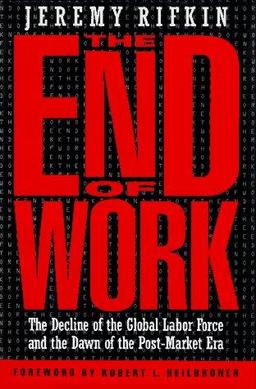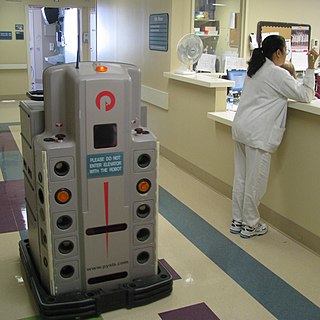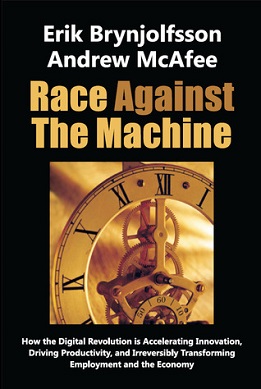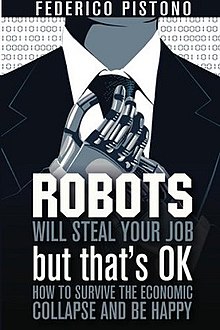
Automation describes a wide range of technologies that reduce human intervention in processes, namely by predetermining decision criteria, subprocess relationships, and related actions, as well as embodying those predeterminations in machines. Automation has been achieved by various means including mechanical, hydraulic, pneumatic, electrical, electronic devices, and computers, usually in combination. Complicated systems, such as modern factories, airplanes, and ships typically use combinations of all of these techniques. The benefit of automation includes labor savings, reducing waste, savings in electricity costs, savings in material costs, and improvements to quality, accuracy, and precision.

An AI takeover is a hypothetical scenario in which artificial intelligence (AI) becomes the dominant form of intelligence on Earth, as computer programs or robots effectively take control of the planet away from the human species. Possible scenarios include replacement of the entire human workforce, takeover by a superintelligent AI, and the popular notion of a robot uprising. Stories of AI takeovers are very popular throughout science fiction. Some public figures, such as Stephen Hawking and Elon Musk, have advocated research into precautionary measures to ensure future superintelligent machines remain under human control.
Structural unemployment is a form of involuntary unemployment caused by a mismatch between the skills that workers in the economy can offer, and the skills demanded of workers by employers. Structural unemployment is often brought about by technological changes that make the job skills of many workers obsolete.
Manna is a 2003 science fiction novel by Marshall Brain that explores several issues in modern information technology, automation and economics, as well as user interfaces and transhumanism.

Humanitarianism in raelian literature is a collection of economic ideas which, according to its creator Raël, is designed to complement Geniocracy.

Emerging technologies are technologies whose development, practical applications, or both are still largely unrealized. These technologies are generally new but also include older technologies finding new applications. Emerging technologies are often perceived as capable of changing the status quo.
"The Triple Revolution" was an open memorandum sent to U.S. President Lyndon B. Johnson and other government figures on March 22, 1964. Drafted under the auspices of the Center for the Study of Democratic Institutions, it was signed by an array of noted social activists, professors, and technologists who identified themselves as the Ad Hoc Committee on the Triple Revolution. The chief initiator of the proposal was W. H. "Ping" Ferry, at that time a vice-president of CSDI, basing it in large part on the ideas of the futurist Robert Theobald.
Robot ethics, sometimes known as "roboethics", concerns ethical problems that occur with robots, such as whether robots pose a threat to humans in the long or short run, whether some uses of robots are problematic, and how robots should be designed such that they act 'ethically'. Alternatively, roboethics refers specifically to the ethics of human behavior towards robots, as robots become increasingly advanced. Robot ethics is a sub-field of ethics of technology, specifically information technology, and it has close links to legal as well as socio-economic concerns. Researchers from diverse areas are beginning to tackle ethical questions about creating robotic technology and implementing it in societies, in a way that will still ensure the safety of the human race.

The End of Work: The Decline of the Global Labor Force and the Dawn of the Post-Market Era is a non-fiction book by American economist Jeremy Rifkin, published in 1995 by Putnam Publishing Group.

The Glass Bees is a 1957 science fiction novel written by German author Ernst Jünger. The novel follows two days in the life of Captain Richard, an unemployed ex-cavalryman who feels lost in a world that has become more technologically advanced and impersonal. Richard accepts a job interview at Zapparoni Works, a company that designs and manufactures robots including the titular glass bees. Richard's first-person narrative blends depiction of his unusual job interview, autobiographical flashbacks from his childhood and his days as a soldier, and reflection on the themes of technology, war, historical change, and morality.

A technological revolution is a period in which one or more technologies is replaced by another novel technology in a short amount of time. It is an era of accelerated technological progress characterized by innovations whose rapid application and diffusion typically cause an abrupt change in society.

Technological unemployment is the loss of jobs caused by technological change. It is a key type of structural unemployment. Technological change typically includes the introduction of labour-saving "mechanical-muscle" machines or more efficient "mechanical-mind" processes (automation), and humans' role in these processes are minimized. Just as horses were gradually made obsolete as transport by the automobile and as labourer by the tractor, humans' jobs have also been affected throughout modern history. Historical examples include artisan weavers reduced to poverty after the introduction of mechanized looms. During World War II, Alan Turing's Bombe machine compressed and decoded thousands of man-years worth of encrypted data in a matter of hours. A contemporary example of technological unemployment is the displacement of retail cashiers by self-service tills and cashierless stores.

Race Against the Machine is a non-fiction book from 2011 by Erik Brynjolfsson and Andrew McAfee about the interaction of digital technology, employment and organization. The full title of the book is: Race Against the Machine: How the Digital Revolution Is Accelerating Innovation, Driving Productivity, and Irreversibly Transforming Employment and the Economy.
Humans Need Not Apply is a 2014 internet video directed, produced, written, and edited by CGP Grey. It focuses on the future of the integration of automation into economics, as well as the impact of this integration to the worldwide workforce. It was released online on YouTube on 13 August 2014. It was later made available via iTunes and RSS.

Martin Ford is an American futurist and author focusing on artificial intelligence and robotics, and the impact of these technologies on the job market, economy and society.
Robotic process automation (RPA) is a form of business process automation that is based on software robots (bots) or artificial intelligence (AI) agents. It is sometimes referred to as software robotics.

Carl Benedikt Frey is a Swedish-German economist and economic historian. He is the Dieter Schwarz Associate Professor of AI & Work at the Oxford Internet Institute and a Fellow of Mansfield College, University of Oxford. He is also Director of the Future of Work Programme and Oxford Martin Citi Fellow at the Oxford Martin School.
Calum Chace is an English writer and speaker, focusing on the likely future impact of Artificial Intelligence on people and societies.
A robot tax is a legislative strategy to disincentivize the replacement of workers by machines and bolster the social safety net for those who are displaced. While the automation of manual labour has been contemplated since before the industrial revolution, the issue has received increased discussion in the 21st century due to newer developments such as machine learning.

Rise of the Robots: Technology and the Threat of a Jobless Future is a 2015 book by American futurist Martin Ford. What are the jobs of the future? How many will there be? And who will have them? As technology continues to accelerate and machines begin taking care of themselves, fewer people will be necessary. Artificial intelligence is already well on its way to making "good jobs" obsolete: many paralegals, journalists, office workers, and even computer programmers are poised to be replaced by robots and smart software. As progress continues, blue and white collar jobs alike will evaporate, squeezing working -- and middle-class families ever further. At the same time, households are under assault from exploding costs, especially from the two major industries-education and health care-that, so far, have not been transformed by information technology. The result could well be massive unemployment and inequality as well as the implosion of the consumer economy itself.












